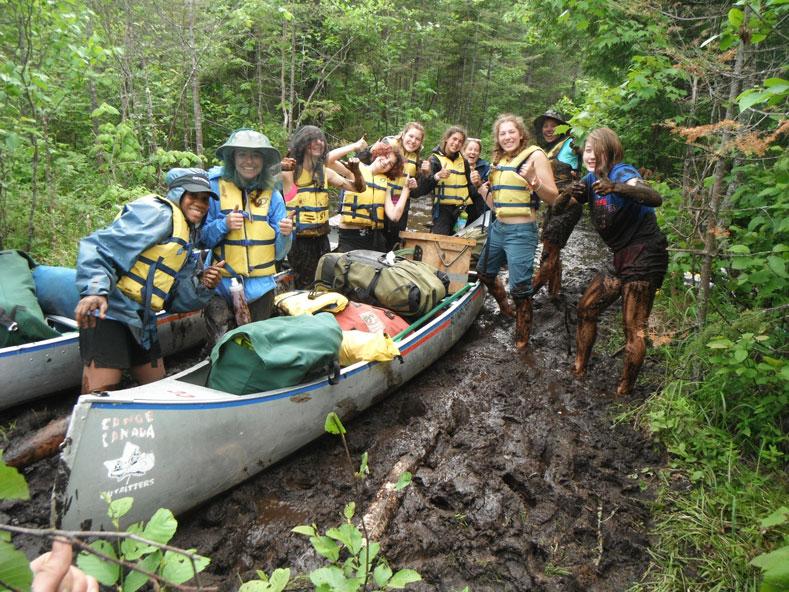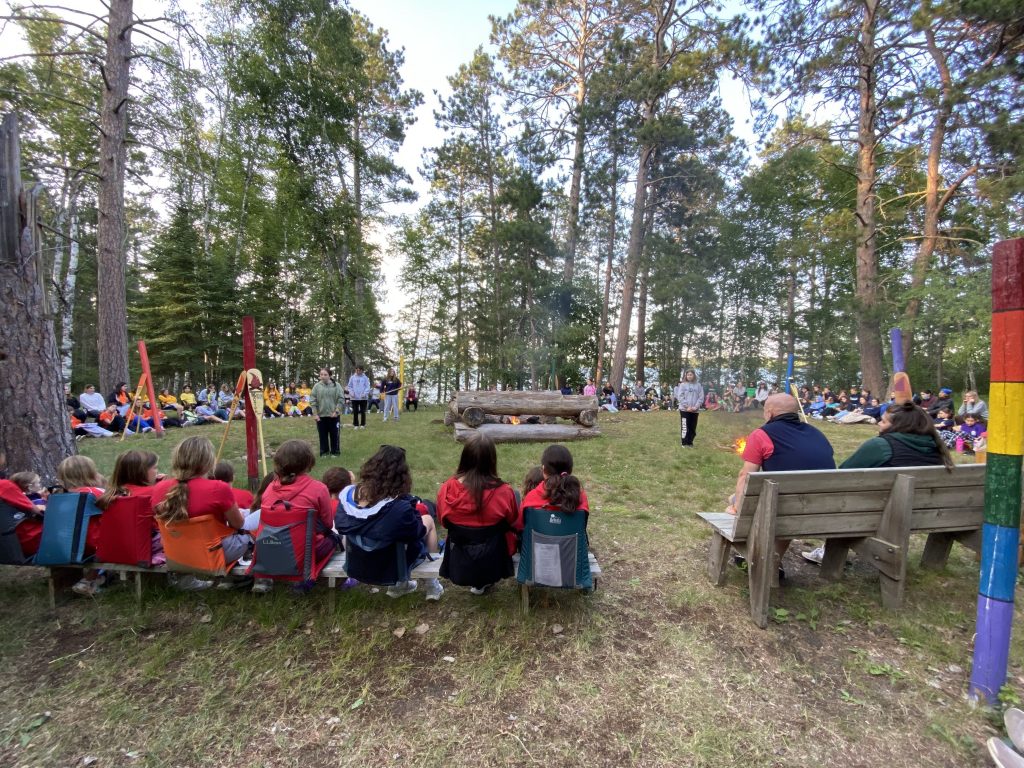Exploring a technology-free summer opportunity for your child? Participation in such camps cultivates life skills, nurtures social interactions, and reconnects children with the natural world. We cover the essential benefits and activities that contribute to a child’s successful break from gadgets, promising a season of growth and fun.
Key Takeaways
- Unplugged summer camps offer kids a break from technology, encouraging personal growth, improved social skills, and a deeper connection with nature and the present moment.
- These camps foster meaningful relationships and teamwork through real-life interactions and outdoor activities, countering the negative impacts of a screen-dominated world.
- Technology-free camps are not just about fun; they provide children with important life skills and self-confidence by facing and overcoming real-world challenges.
Exploring the Unplugged Camp World

Children enjoy outdoor activities at a summer camp
Unplugged camps provide a distinctive summer experience. It’s all about disconnecting from electronics, taking a technology break, and reconnecting with nature and real-life experiences. This tech-free environment is not just a refreshing change but also a catalyst for personal growth.
Children can significantly enhance their communication and relationship-building skills in a technology-free environment. Many camps are designed to help children broaden their horizons, learn new habits, and develop resilience. This is achieved by replacing screen time with engaging “face-to-face” time that develop a child’s abilities and talents.
Why is limiting screen time so important? Research has shown that increased screen time can lead to negative effects such as reduced social skills and increased anxiety. Unplugged summer camps offer a solution to this issue by providing an environment where children can engage in face-to-face interactions and develop their social skills.
These camps aim not only to reduce screen time but also to provide a rich, memorable summer experience. They offer a chance to:
- Reduce stress and anxiety
- Increase the ability to read human emotions and develop deeper empathy for others
- Learn to be present
- Connect with nature
- Broaden horizons
- Improve communication skills
- Develop independence and resilience.
Crafting Meaningful Relationships Without Screens

Campers gather around the campfire for songs and stories
Central to these unplugged summer camps is the emphasis on fostering meaningful relationships. Without the distraction of cell phones and screens, children are encouraged to talk, play, and work together in teams. This face-to-face interaction can greatly enhance their communication skills and socio-emotional learning.
A variety of activities at these camps promotes teamwork and helps in building new friendships. Some of these activities include:
- Water balloon fights
- Scavenger hunts
- Hiking
- Horseback riding
- Group problem-solving tasks
These activities are not just fun, they also help in building strong, lasting friendships with new friends.
These camps counteract materialistic and competitive cultures, creating a space for spontaneous interactions within a supportive camp culture. This culture helps in nurturing and inspiring strong friendships among campers and developing relationship skills.
In a world where we’re increasingly dependent on screens for communication, these camps provide a refreshing change. They show us that it’s possible to:
- build strong bonds
- improve our communication skills
- authentically connect with others
- have fun
all without the need for cell phones or screens.
Embracing the Great Outdoors

Children hiking in the natural environment during a summer camp
One significant advantage of technology-free summer camps is the chance to immerse oneself in nature. Campers can fully immerse themselves in the natural world by participating in activities such as:
- Overnight camping trips
- Sleeping under the stars
- Savoring meals cooked by the fire
- Hiking to witness the majestic Giant Sequoia trees, waterfalls, and even the Headwaters of the Mississippi River
Nature plays a crucial role in shaping the development of children at these camps. It:
- Nurtures their experience with nature
- Promotes creativity and imagination
- Provides a natural setting for fostering meaningful relationships through play, which enhances a child’s ability to connect with others.
Unplugged camps provide a range of enjoyable outdoor activities, including:
- Tree climbing
- Outdoor cooking
- Games like Gaga and Capture the Flag
- Nature walks
- Camp crafts
- Outdoor sports
- Engaging in water skills
Participants can enjoy these activities and immerse themselves in nature.
Offering a tech-free environment, these camps encourage children to:
- Break away from their screens
- Form a bond with nature
- Appreciate the beauty of the natural world
- Understand the importance of preserving it for future generations.
- Gain appreciation for interactions with peers face-to-face vs. a virtual reality
Developing Life Skills Through Real Challenges
Tech-free camps create an optimal setting for children to cultivate life skills by facing real-life challenges. These camps give young people the chance to take control of their lives and build confidence by tackling new challenges and utilizing their own problem-solving and critical thinking skills.
Activities like canoeing, hiking, and sleeping under the stars in nature are designed to empower campers. They help them learn to navigate the outdoors, make decisions, and solve problems on their own, fostering a sense of independence and allowing them to interact with other kids.
In addition to traditional outdoor challenges, these camps offer exciting activities like manual photography and stage makeup without the use of screens! Campers can even practice the art of writing letters home to share their experiences with family and friends.
Tech-free camps foster problem-solving skills, resilience, and independence in children by presenting them with real challenges. These skills are not just beneficial during their time at the camp but can also prepare them for future success.
Navigating Parental Concerns and Expectations
Selecting the appropriate summer program for your child can be a challenging task. There are several factors to consider, including the physical environment, daily life, and the blueprint for the experience. You also need to define and quantify quality to ensure you choose the perfect summer program for your child.
A crucial factor to consider is the program’s technology policy. It’s crucial that the program’s technology policy is clearly aligned with its core philosophy and goals and is effectively managed. Understanding the technology policy is important as it can either enable or limit the use of technology such as:
- smartphones
- music players
- tablets
- e-readers
- access to social media platforms
Understanding the technology policy helps you ensure your child maximizes their summer program experience during the school year.
Finding the Right Fit: Selecting the Perfect Camp
The search for the ideal camp requires exploring diverse options, including budget-friendly and specialized programs. There are various affordable summer camp options available, including those offered through organizations like the Boy Scouts and Girl Scouts, as well as free programs like the Fresh Air Fund.
Local park districts provide affordable half- and full-day camp options ensuring that summer camps are accessible to a wider community. Through scholarships, payment plans, and early registration discounts, traditional summer camps can be more accessible, enabling a greater number of children to partake in activities like service projects and outdoor adventures. It is important to consider how much money you are not spending when your child is living at a sleepaway camp and the cost of participating in these specialized activities at home would be. Taking those factors into account, the complete break from technology at a long-term sleepaway camp is a fantastic option.
Specialized camp programs like Boy Scout and Girl Scout camps offer memorable experiences, while camps held at places of worship provide a unique environment for summer camp activities. Thorough research of different options can help ensure a memorable and enriching experience for your child.
Summary
In summary, technology-free summer camps provide an enriching and memorable experience for children. They offer a unique opportunity for personal growth, the development of social and communication skills, and an appreciation for nature. These camps also provide real-life challenges that help children develop important life skills such as resilience and independence. As parents, it’s important to consider your child’s needs and interests and understand the technology policy of the camp to ensure a balance between fun and personal growth. With careful consideration and research, you can find the perfect camp for your child.
Frequently Asked Questions
Why don’t summer camps allow phones?
Summer camps do not allow phones to create an electronic-free environment and to help children disconnect from constant technology stimuli. It allows campers to truly engage in the opportunities in front of them.
How old do you have to be to go to summer camp?
You can send your child to summer camp as early as age 5 or 6 for day camps and between 7 to 18 for sleepaway camps. Remember, the experience will be a valuable one for your child and you as well!
Who is the target audience for summer camps?
The target audience for summer camps is the parents of children who want their child to develop lifelong skills like resilience, independence, communication, and critical thinking skills.
What are the benefits of unplugged summer camps?
Unplugged summer camps provide numerous benefits such as reducing stress and anxiety, improving communication skills, and fostering independence and resilience. Embracing a tech-free environment can enrich your summer experience and enhance personal growth.
How can technology-free interactions help children?
Technology-free interactions can enhance children’s communication skills, promote teamwork, and help in building strong friendships. These interactions also contribute to socio-emotional learning.

